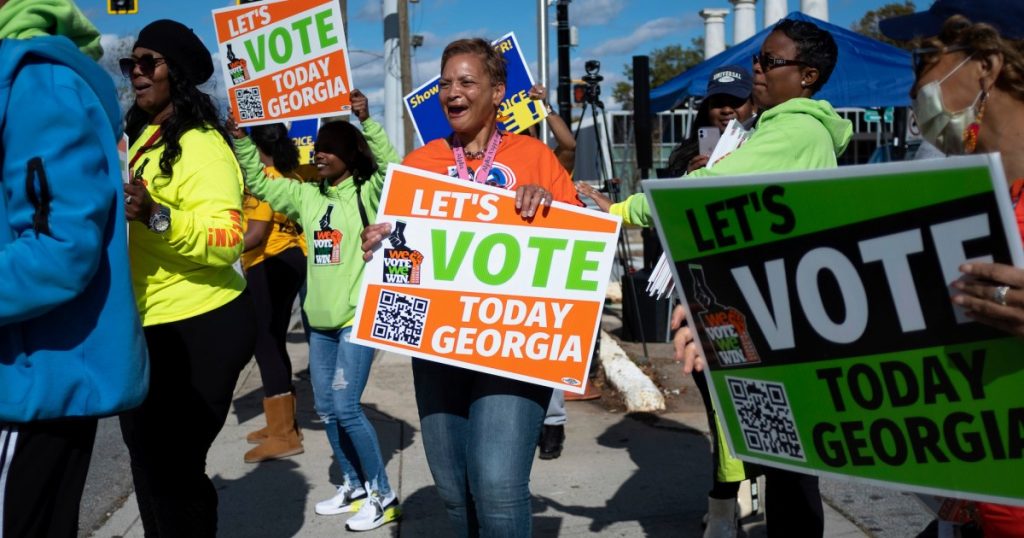Trump-Appointed Judge Upholds Georgia Runoff System That Curbs Voting Access
People gather during a get out the vote rally Nov. 27, 2022, in Atlanta, during early voting for the Senate runoff election. Ben Gray/AP
Fight disinformation: Sign up for the free Mother Jones Daily newsletter and follow the news that matters.A federal judge appointed by Donald Trump on Friday declined to block the state’s system for runoff elections, which was originally designed to dilute Black voting power in the early 1960s and revamped by Republicans in 2021 to dramatically curb ballot access after Democrats won two US Senate elections.
As part of a sweeping package of voting restrictions passed after Trump tried to overturn Joe Biden’s victory in the 2020 election, Georgia Republicans shortened the period for runoff elections from nine weeks to four weeks and cut the early voting period from three weeks to one week, with no mandatory weekend voting. The law also forbade new voters who registered after the general election from voting in the runoff. These moves came after Democrats Jon Ossoff and Raphael Warnock won runoff elections in January 2021.
Black voters sued and said the runoff system violated their rights under the Fourteenth and Fifteenth amendments. But federal district court judge J.P. Boulee, who Trump appointed to the bench in 2019, denied a preliminary injunction, writing that the plaintiffs failed to “show a substantial likelihood of success on the merits as to their claims.”
The new runoff system led to widespread confusion in December 2022, when Warnock faced off against Republican Herschel Walker for a full US Senate term. Republican Secretary of State Brad Raffensperger said there would be no Saturday voting because of a little-known state holiday honoring Confederate leader Robert E. Lee. That outraged voting rights advocates, who successfully sued to reinstate Saturday voting in some counties, but the highly compressed early voting period led to long lines at the polls.
In Georgia, a runoff election must be held when neither candidate for office obtains 50 percent of the vote in the primary or general election. The system dates back to 1964, after the Supreme Court struck down an electoral system in Georgia that gave conservative rural counties far more power than moderate urban ones. Denmark Groover, a segregationist state representative, warned that “all we have to have is a plurality and the Negroes and the pressure groups and special interests are going to manipulate this state and take charge.” So he introduced the runoff system “as a means of circumventing what is called the Negro bloc vote.”
Prior to the victories of Warnock and Ossoff, the electorate in runoff elections was consistently older, whiter, and more Republican than the state as a whole.
Yet even some Republicans now want to do away with runoffs in the state because of their inconvenient timing at the end of the year. Raffensperger recently called on the GOP-controlled legislature to abolish them. “In 2024, Georgians should spend the season with loved ones and create lasting memories—not being inundated with political solicitations for an upcoming runoff,” he said.





